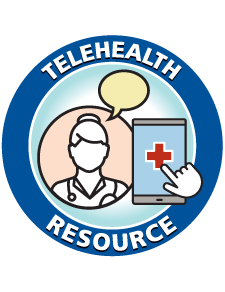Using Telehealth
To minimize the risk of infection from COVID-19, dialysis patients are encouraged to schedule essential appointments via telehealth.
What is Telehealth?
Telehealth simply means having a medical appointment in another way―not in person. You can have a telemedicine visit with your healthcare team by phone or by using a smartphone, tablet or computer with a camera.Technology connects you with your healthcare team This makes it possible for your doctors or other healthcare professionals, to have a medical visit with you no matter where you are.
Who can provide healthcare services through telemedicine?
A range of providers that includes doctors, nurse practitioners, registered dietitians, licensed clinical social workers and mental health providers are able to offer telehealth as long as it’s appropriate for you!
Am I eligible to receive care through telemedicine?
Medicare and Medicaid beneficiaries are able to receive a number of approved services via telehealth through new rules put in place during the COVID-19 pandemic. These guidelines have been extended past the COVID emergency. Many other private insurance programs also have telehealth approved services.
What equipment will I need?
Using telehealth from your home or to schedule an appointment with other non-dialysis providers, you may need:
- Internet connection
- Computer, tablet, laptop, or phone with teleconference capabilities
- Access to a specific application and provider specific login (your provider will assist you with this)
- A telehealth “buddy” to assist you and troubleshoot problems as they arise and make you more comfortable using the technology.
Telehealth Patient Resources
These resources are for ESRD patients thinking about or are currently using telehealth during the pandemic. Telehealth is an important and helpful resource to keep patients safe while reducing the risk of exposure to COVID-19.
IPRO ESRD Network Program Telehealth Toolkit
- Telehealth is here to stay. Here’s Why: Handout
- Stay Healthy, Stay Home Telehealth Toolkit Patient Reference Guide: Network 1|Network 2|Network 6|Network 9
- Home Dialysis Patient Telehealth Visit Checklist: Handout
- The Benefits of Telehealth Handout: Network 1|Network 2|Network 6|Network 9
- Using Telehealth to Meet with Your Dialysis Team: Video
- The Doctor Will See You Now: Telemedicine Makes it Easy: Handout
- Kidney Patient Care: Your Guide to Using Telemedicine: Handout
- Using Telehealth to Visit with Your Doctor: Video
Other Resources
Accessing Telehealth Support Groups and Services
Support Groups
ESRD patients may need extra support to assist them in understanding and adjusting to their new normal of dialysis or transplant. Telehealth support groups can be a helpful resource to keep patients connected, reduce loneliness, depression and anxiety while keeping the patient or family member informed in the comfort and safety of their home.
- American Association of Kidney Patients (AAKP) Community: AAKP recognizes the value of local patient support groups. Through its website and various publications, the AAKP Community provides a centralized resource to locate ESRD support groups within patients’ communities.
- Helparound Phone App: Helparound assists chronic kidney disease patients and their support systems, overwhelmed by a life-changing condition, to simplify the day-to-day management of dialysis treatment. NxStage delivers information and support resources as needed, when needed, via smartphone.
- Home Dialysis Central Forums: Home Dialysis Central is an online discussion forum and a one-stop resource for patients and professionals who want to learn more about home dialysis options—what they are, where they can be found, and why someone might want to choose one over another. Patients, family members, and caregivers can get advice from experts or other members of the home dialysis community, or they can share their knowledge with others.
- Nephkids Cyber-Support Group: This resource is a cyber-support group for parents of children with CKD. It offers an interactive email group (listserve) for parents of children with many types of chronic kidney disease.
- National Kidney Foundation (NKF) Peers Lending Support: 1-855-653-7337 (1-855-NKF-PEER) This NKF website is specifically for new patients who need support and want to connect with peers who “have been there.”
- Renal Support Network (RSN) HOPEline Peer Support: 1.800.579.1970 The RSN website empowers people who have kidney disease to become knowledgeable about their illness, proactive in their care, hopeful about their future, and to make friends through informative, patient-directed programs.
Commonly Used Apps to Keep You Connected
The following apps can be downloaded to an Apple or Android device or personal computer.
- Google Meet allows you to connect face-to-face with audio and video from almost anywhere.
- FaceTime supports video and audio calling between Apple devices. It lets people with iPhones, iPads, and Mac computers make easy video calls to one another.
- Microsoft Teams allows you to connect face-to-face with audio and video from almost anywhere.
- pMD is software that allows healthcare workers to connect with patients through video calls. It also allows healthcare workers to share patient information using a cell phone in a secure way.
- Skype lets people make and receive free voice and video calls over the internet using a computer, web browser, or mobile phone.
- Zoom allows video and audio conferencing, webinars, live chats, screen-sharing, and more.

